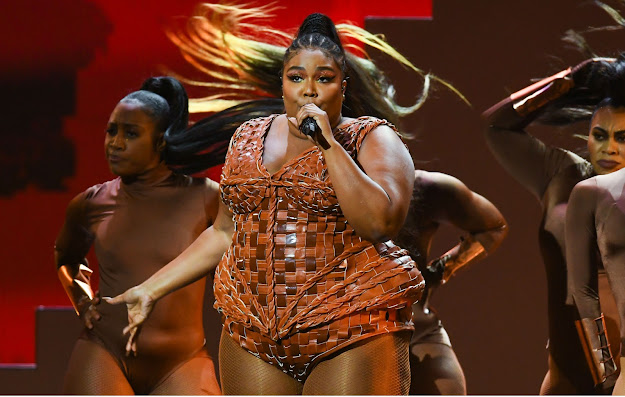In this week’s readings, I got to thinking about my favorite pop artists (and quietly defending them in my mind) especially while reading Adorno’s article on Popular Music. Especially when he said pop music promotes “pseudo-individualization – “endowing cultural mass production with the halo of free choice… [keeping people] in line by making them forget that what they listen to is already listened to for them, or ‘pre-digested’. (Adorno, On Popular Music, 69) That may be true for many pop-musicians, but not all.
For my defense of pop music, I chose the artist Lizzo – because her music is catchy but in a way that forces ALL of my attention to the lyrics, beat and melody of her music. It does not draw my attention in a way (as Adorno would say) that “is simultaneously one of distraction and inattention”. Lizzo's music focus all my attention because it is funny, sexy and catchy, but also because it is socially accepting of large women, people of all colors, and all sexualities.
Interestingly while researching Lizzo further online, I did discover that in spite of her unique messaging, she has been accused of copying other’s work. One of her most popular songs “Truth Hurts” has been under fire for being too similar to artist Rae Sremmurd’s song “Black Beatles”. Listen to a comparison below.
Additionally, Lizzo has been taken to court and ordered to give partial credit for using a twitter post by singer songwriter Mina Lioness as a lyric in the same song.

Whether right/true or not, I feel like this is an example of Bermingham’s Remix manifesto – specifically “that our future is becoming less free” by allowing copyright to limit innovation. I personally cannot explain how acoustically this song still seems groundbreakingly original to me, I simply do not have the knowledge or vocabulary to do so – but I know that it is the “paralanguage” of many compelling sounds, lyrics, beats etc. reshaped into a unique form that did it. “Paralanguage refers to the nonverbal vocal cues that accompany words (e.g., pitch, volume, rate pauses) to convey the emotional tone of a message… We can only determine which emotion is communicated by considering all the paralinguistic cues holistically in conjunction with one another and with the words.” (Sellnow, 172)
This video on the making of Lizzo’s music breaks down some of the very thoughtful inspirations, and unique sounds used in the making of “Truth Hurts” and how they were combined to create the record-breaking album “Cuz I Love You”.
Start at 2:47 to hear about "Truth Hurts" specifically.
After reading and listening to the videos above, my question for you is, do you think Lizzo stole from fellow artists or is her song “Truth Hurts” an original work inspired by others?
Article by Bo Weber about Lizzo’s Lawsuits for MusicInMinnesota.com:https://www.musicinminnesota.com/lizzo-truth-hurts-copyright-rae-sremmurd-black-beatles/
Truth Hurts Lyrics: https://www.azlyrics.com/lyrics/lizzo/truthhurts.html


This comment has been removed by the author.
ReplyDeleteI love Lizzo, yet she should give them credit and compensation if she used the melody from a different artist. I mean, don't get me wrong, I only agree with the melody part; the tweet would be brutal to prove she used it as inspiration. It was very far reached. Lizzo's tone and attitude are part of the song, and you cannot get that from a tweet.
ReplyDeleteAs for Adorno, I was not too fond of the article; it seemed very bias and, well, to be honest, a little classist. Yet, he does have some points on the repetitiveness of pop music, but he could have said that without writing several pages about it.
I think that Lizzo not only consumes, digests, and regurgitates melodic prose - but also the negative habits of a culture of young women who see "defying" convention as "winning." As a father of a little girl, I'm saddened that so many women seem to find themselves in her positioning, and look up to her. Despite the difficulty in being "original" when everything that is done - is now recorded, analyzed, dissected, and documented - it's the job of an artist to own what is theirs and give credit where credit is due.
ReplyDelete"Being 100% that bitch" isn't original - Ask Madonna.